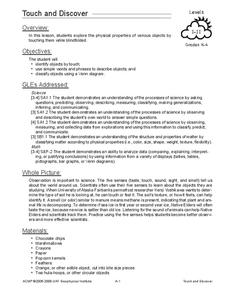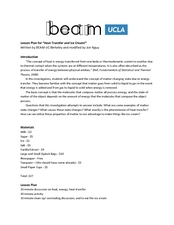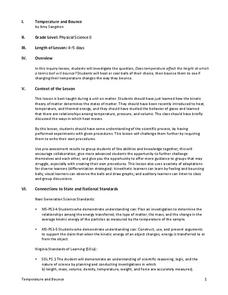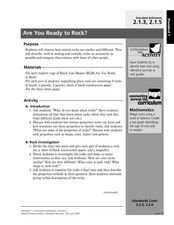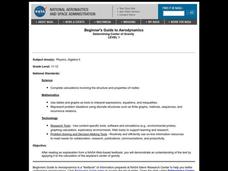Teach Engineering
Viscous Fluids
Elasticity and viscosity. Help your class understand the similarities and differences with an introduction to viscous fluids. After describing four types of fluid behaviors: shear thinning, shear thickening, Bringham plastic,...
Curated OER
Liquid Rainbow
Students develop their own techniques for drawing a small sample of solutions into a straw. They hypothesize ways to increase the density of water, and discuss how salt-free rainwater tends to float on top of salty seawater.
Benjamin Franklin High School
Saxon Math: Algebra 2 (Section 9)
Section 9 of the 12 linked Saxon Math sections introduces the young algebrist to graphing periodic functions, creating graphs from quadratic roots, working with inequalities, and rational equations. Common among all the lessons is the...
American Chemical Society
Investigating the Line
Note that this lesson is best paired with the preceding lesson in the unit. In that lesson, elementary physical scientists observed that the color coating of M&Ms® candies do not mix when dissolved off of the chocolate surface. Now...
Curated OER
Anatomy of an Element
Learners discuss matter and atoms using this resource. First, they look at a website describing atoms. Then, they learn about the periodic table and discuss how it is organized. Finally, they create a comic strip to display their...
Curated OER
To stretch or not to stretch
Hands-on is the best way to play. Learners read a graph that shows the force needed to stretch a rubber band. They do this and then participate in a simple experiment where they create coiled springs with wire. They work to determine how...
Curated OER
Properties of Matter Word Search Puzzle
In this science worksheet, learners look for the words that are associated with the measurements taken in an average science class.
Cornell University
Polymers: Instant Snow
Is it easy to make snow? Scholars use critical thinking skills as they investigate the concept of polymers by making snow. The class tests several different variables and takes measurements over the course of several days. They then...
Curated OER
Touch and Discover
Students identify the physical properties of items using the sense of touch. For this touch and discover lesson, students describe items. Students sort items using a Venn diagram.
Curated OER
Introduction to Materials Science - Part B
Students are able to give specific examples of what to do and what not to do during given safety situations, and classify materials as metals, polymers, ceramics/glass, or composites. They are able to distinguish between chemical and...
Curated OER
Solids, Liquids and Gases - Part 2
Students experiment with balloons, soda water and raisins to find out about the states of matter. In this solids, liquids and gases lesson plan, students complete a group activity with balloons to recognize the state of matter in...
Curated OER
Marshland Ecosystems
Young scholars identify animals in ecosystem depicted on 16th Century ceramic basin and classify them as herbivores, carnivores, or omnivores based on physical characteristics and prior knowledge, determine which life forms in ecosystem...
Curated OER
Solutions and Suspensions
Students explore matter by conducting an in class demonstration. In this liquid mixture lesson, students identify the difference between a solution in which a solid dissolves into liquid, and a suspension where the solid doesn't dissolve...
Curated OER
"Heat Transfer and Ice Cream!"
Students analyze earth science by creating a frozen treat in class. In this heat transfer lesson, students discuss how matter is transformed from solid to liquid and liquid to gas when energy is removed from the equation. Students...
Curated OER
Strange States of Matter
Fourth graders explore objects that do not fit into the categories given by three states of matter. They explore why an object doesn't fit perfectly into one of the three categories. Students observe the properties of Oobleck. They...
Curated OER
Water and Ice
Students investigate the states of matter. In this physics lesson plan, students use water and ice to demonstrate the characteristics of a solid and liquid. Students record their observations as the state of the water changes.
STEM for Teachers
Temperature and Bounce
Take part in a fun experiment and hold an impromptu bouncing contest with your class. Young scientists heat and cool balls before bouncing them to determine whether temperature changes affect how they bounce. The set of...
Curated OER
Physics Post-Lab
Students explore physics. For this science lesson, students discuss physics in their everyday lives. Students complete a physics worksheet.
Curated OER
Properties of Color
Second graders explore the properties of primary color and investigate what happens when primary colors are mixed. They listen to the story The Crayon Box That Talked and list the colors. They experiment mixing primary colors and...
Curated OER
Constancy and Change
Second graders identify three forms of matter- solids, liquids, and gases with 100% accuracy. They observe what happens when they try to put two kinds of matter into the same space and conclude that solids, liquids, and gases occupy space.
Curated OER
Force and Motion
Students experiment with force and motion. In this force and motion instructional activity, students test gravity using a variety of objects. Students rotate through a series of stations which use force, motion, friction, and inclines....
Curated OER
Are You Ready to Rock?
Second graders investigate rock samples using magnifying class. In this earth science lesson, 2nd graders identify the physical properties and describe them verbally with their partners. They compare their findings with the class.
Curated OER
Determining Center of Gravity
Students complete calculations involving the structure and properties of matter. They engage in a variety of problem solving activities to help them determine the center of gravity.
Curated OER
What About Cantaloupes?
Second graders investigate the physical properties of cantaloupe using their senses. In this life science instructional activity, 2nd graders estimate the weight of their sample. They get it's actual weight and compare it with their...










